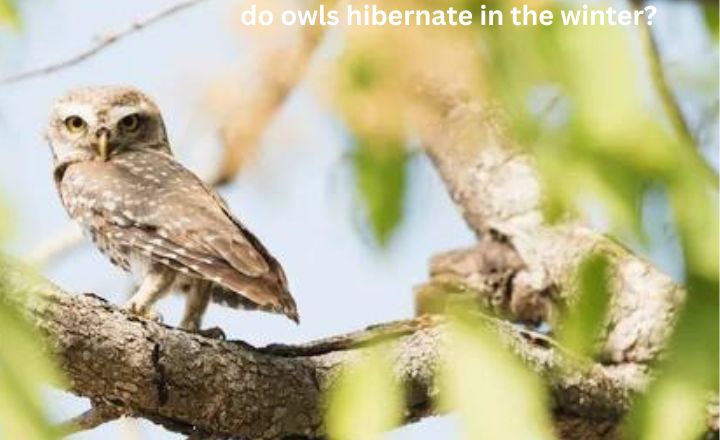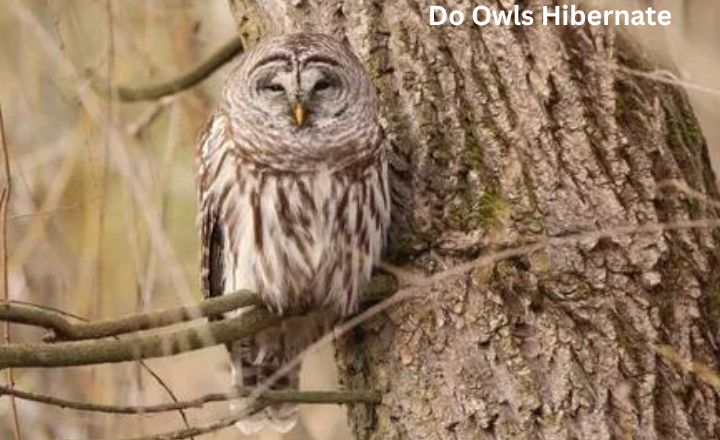As winter blankets the world in a frosty embrace, the haunting call of owls echoing through the night adds an air of mystery to the snowy landscape. But amidst the stillness and cold, a question lingers in curious minds – do owls hibernate? These majestic creatures with their silent flight and intense gaze have long been associated with wisdom and magic.
Yet, as the snow falls softly around us, one cannot help but wonder if these elusive birds simply disappear into slumber during the harsh winter months. Specifically, do snowy owls hibernate like their forest-dwelling counterparts? Join us on a journey into the depths of nature’s wonders as we unravel the mystery behind whether owls truly hibernate in the winter or if there is more to their enigmatic behavior than meets the eye.
do owls hibernate in the winter?

During the winter months, many animals hibernate to conserve energy and survive the harsh conditions. But what about owls? Do Owls Hibernate or not? Contrary to popular belief, owls do not hibernate in the traditional sense. Instead, they become more nocturnal in the winter months, hunting primarily at night when prey is more abundant. This behavior adjustment allows owls to maintain their energy levels and stay active throughout the season.
While owls may not hibernate like some other animals, they do exhibit a certain level of torpor during extreme cold spells. Torpor is a state of reduced metabolic activity that helps them conserve energy when food sources are scarce. This adaptation enables owls to withstand harsh winter conditions without going into a full state of hibernation.
Understanding Owl Behavior in Winter
While many animals hibernate during the winter months to survive the harsh conditions, owls do not hibernate. They are known for their nocturnal habits and impressive hunting skills in any season, including winter. However, owls do exhibit certain behaviors during the colder months to conserve energy and stay warm. Get all info about Owls in Michigan (7 Species To Know),
Snowy owls, a stunning species well-adapted to cold climates, do not hibernate either. Instead, they may migrate southward in search of food when their prey becomes scarce in their usual habitats. This movement is not a form of hibernation but rather a survival strategy that helps them endure the winter season. Owls are resilient creatures that adjust their behaviors based on changing environmental conditions, showcasing their ability to thrive even in harsh winter environments.
- Unlike many other animal species, owls do not hibernate during winter. Instead, they have unique adaptations that allow them to thrive in cold conditions. With their endothermic nature, owls can internally regulate their body temperature to stay warm even when temperatures drop. This incredible ability enables them to remain active year-round.
- Adapted Hunting Techniques: Their hunting techniques evolved to suit the scarcity of food sources, focusing on small mammals and birds that are easier to catch in cold weather. Adapted hunting techniques play a crucial role in an owl’s survival during the winter season. They leverage their silent flight and sharp talons to ambush prey efficiently, making them formidable predators even in challenging conditions. By targeting specific types of animals that are more readily available, owls demonstrate remarkable flexibility in their hunting strategies, showcasing their ability to thrive in diverse environments.
- Change in Diet: the change in diet for owls during winter is a crucial aspect of their survival strategy. As small mammals and insects become scarce, owls shift their focus to larger prey such as rabbits and other birds. This adaptation showcases the flexibility and resourcefulness of these majestic birds of prey.
- Physical Adaptations: These physical adaptations enable owls to thrive in harsh winter climates without hibernating. By understanding these unique behaviors and adaptations, we gain a deeper appreciation for how these majestic creatures have evolved to survive and thrive in challenging environments. Do Owls Hibernate? No, owls do not hibernate during the winter months.
- Seeking Shelter: Seeking shelter is a crucial aspect of owl behavior in winter. Owls are adept at finding sheltered spots such as dense foliage, tree cavities, or old abandoned buildings to protect themselves from harsh weather elements. These sheltered locations provide owls with insulation against cold temperatures and help them stay warm during the colder months. By understanding where owls seek shelter in winter, we can further appreciate their resilience and adaptability to survive in challenging environments.
- Migration: Migration is another fascinating aspect of owl behavior during winter. While some owl species are year-round residents in their range, others are known to migrate southward in search of warmer climates and abundant prey. This instinct to migrate ensures the survival of these incredible birds by allowing them access to food sources even when temperatures drop significantly.
- Torpor? Torpor is a state of decreased physiological activity that allows owls to conserve energy when food sources are scarce. During torpor, an owl’s metabolic rate decreases significantly, enabling them to survive on minimal food intake.
Summary
Do Owls Hibernate? Owls do not hibernate in the traditional sense, they do exhibit certain behaviors in winter that allow them to conserve energy and survive the cold months. By understanding how owls adapt to winter conditions, we can better appreciate these fascinating creatures and the strategies they employ to thrive in their environment. Owls rely on their thick feathers, efficient hunting skills, and unique physiology to endure the harsh winter weather. As we continue to study owl behavior, we gain valuable insights into the intricate ways wildlife adapts to seasonal changes. Let’s take this opportunity to observe and learn from these remarkable birds during the winter months.
Choosing TechLeez can lead to significant savings. Businesses save an average of 20% on technology costs by outsourcing to specialists versus in-house solutions
Do owls hibernate in the UK?
No, owls do not hibernate in the UK. They are active year-round, hunting and nesting throughout all seasons.


